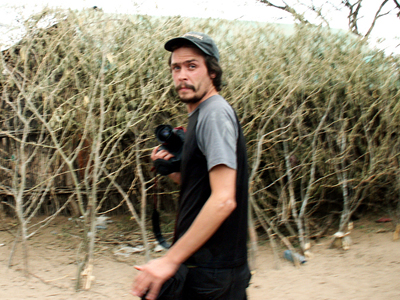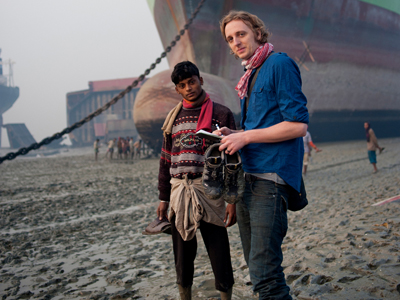Two Swedish journalists, Johan Persson and Martin Schibbye, were found guilty on Wednesday 21 December, 2011, of supporting terrorism in Ethiopia and entering the country illegally.
The pair entered Ethiopia embedded with forces of the Ogaden National Liberation Front (ONLF) on 1 July this year and were detained by the Ethiopian military shortly afterwards. Schibbye and Persson had traveled as freelance journalists aiming to report from the Ogaden province, the scene of a brutal conflict between Ethiopian armed forces and the ONLF.
Jesper Bengtsson, chair of the Swedish section of Reporters Without Borders, commented on the verdict on Swedish Public Radio:
I had hoped, and I think everyone had hoped, that the Ethiopian authorities had already made an example of Persson and Schibbye by starting the trial process and jailing them for six months. Obviously that wasn't enough of an example.
Early on Wednesday morning, Judge Shemsu Sirgaga denied the defense's main argument, which held that Schibbye and Persson travelled professionally and had a journalistic duty to report on the conflict from the side of the rebel forces as well as that of Ethiopia's military, and sided with the prosecution.
Sirgaga commented that the Swedes had “used their profession as a cover for terrorist activities” and called for an 18-year prison sentence to be handed down on 27 December, despite Schibbye and Persson's background in reporting from dangerous parts of the world and the testimony by two of Schibbye's and Persson's colleagues, freelance journalists Adrian Blomfield and Phillip Ittner, who had been flown into the capital Addis Ababa to take part in the court proceedings.
The video below shows Martin Schibbye and Johan Persson, filmed by Ethiopian authorities after being detained, uploaded to YouTube by user rug571 on December 16.
During the trial, Schibbye and Persson admitted to entering Ethiopia illegally embedded with the rebels, but denied any charges of supporting terrorism. In November, the pair were acquitted of the third charge against them, of being “members of a terrorist group”.
“Political prisoners”
Mattias Göransson, the editor-in-chief of Filter magazine – the only client of Schibbye and Persson's to publicly acknowledge it had been in touch with the pair before their African trip – was called as a witness during the trial, and expressed disappointment with the verdict when interviewed by Reuters in Sweden:
When the judge read out the grounds it sounded positive, he had virtually nothing against them. Everything he said was speaking for an acquittal, and then he found them guilty anyway. This indicates they are political prisoners and nothing else.
The case against Schibbye and Persson has brought further attention to Ethiopia's vague anti-terrorist legislation, under which over 100 opposition leaders and journalists have been jailed up to 20 years. Three Ethiopian journalists are currently on trial for terrorism charges.
The Swedish section of Amnesty International said it is critical of Ethiopia's arbitrary interpretation of the anti-terror legislation. Lise Bergh, the General Secretary, said she is convinced of Schibbye and Persson's innocence [sv]:
Amnesty International does not believe there is any evidence of the men supporting the ONLF or its operations, nor that they are guilty of any criminal act. We regard Johan Persson and Martin Schibbye as prisoners of conscience, as they have been prosecuted due to their legitimate work as journalists.
Until the day of the verdict's announcement, the Swedish government had been fairly silent on the case. Carl Bildt, the foreign minister, had referred to methods of quiet diplomacy when asked about how the Swedish Foreign Ministry were working for the release of the journalists.
The situation has been further complicated by Bildt's personal history. Until 2006, when Bildt was appointed foreign minister, he served as a board member of Lundin Petroleum, the Swedish oil company whose activities Schibbye and Persson were intending to investigate in the Ogaden province.

Johan Persson prior to his and Martin Schibbye's detainment ©Kontinent Agency AB, used with permission.
After the verdict was announced, Bildt commented on the case on Twitter:
@carlbildt: Sweden expresses grave concern over hard sentence against Swedish journalists in Ethiopia. We will continue to work to set them free.
Bildt's comment was followed by a statement from Fredrik Reinfeldt, the Swedish prime minister:
Our position is and continues to be that they were in the country on a journalistic assignment. They must be released as soon as possible in order to be reunited with their families in Sweden.
At an afternoon press conference [sv], Bildt stated that high-level diplomacy was now the prioritized course of action:
We are now making sure that the prime minister's strong message gets through to the Ethiopian government. We will then reason with the parties involved over the formal steps to be taken in this process.
A mellow reception awaited the official statements in social media. Under the hashtag #EthiopiaSwedes, tweets were sent out blaming the Swedish authorities for what is perceived as several months of perceived inertia regarding the case. Twitter user @tommyskot asked:
@tommyskot: When will @sweden and @carlbildt do something to get our journalists home? #EthiopiaSwedes
Below is a sample of reactions from Twitter:
@annalindberg: Now we begin to understand what conditions African journalists are working under. #ethiopiaswedes
@sweden: I'm shocked and appalled by the verdict against #ethiopiaswedes
@hurriya: spread this initiative to build solidarity for #ethiopiaswedes http://www.facebook.com/freejohanandmartin #svpol
Seleshi Ketsela, one of Schibbye and Persson's lawyers, said that his clients would now consider whether to appeal. An alternative route may be to seek a pardon from the Ethiopian state.








6 comments
Shame on the Ethiopian authorities. These guys just wanted the news.